

Number of Employers Passing on Applicants Due to Social Media Posts Continues to Rise, According to New CareerBuilder Survey - CareerBuilder. Employers Share Most Unusual Things They Found on Candidates’ Social Media Profiles CHICAGO – June 26, 2014 – More employers are turning to social networking sites to find additional information on potential candidates – and they’re not entirely impressed with what they’re seeing.
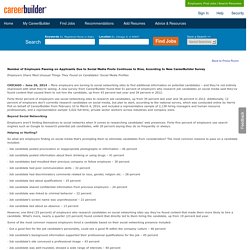
A new survey from CareerBuilder found that 51 percent of employers who research job candidates on social media said they’ve found content that caused them to not hire the candidate, up from 43 percent last year and 34 percent in 2012. Forty-three percent of employers use social networking sites to research job candidates, up from 39 percent last year and 36 percent in 2012. Beyond Social Networking Employers aren’t limiting themselves to social networks when it comes to researching candidates’ web presences.
Helping or Hurting? So what are employers finding on social media that’s prompting them to eliminate candidates from consideration? · Job candidate had poor communication skills – 32 percent Privacy. Online Employment Screening and Digital Career Capital. The Writing on the (Facebook) Wall: The Use of Social Networking Sites in H...: EBSCOhost. Social Media Policies in the Workplace: It's All About Respect. Virtually everyone uses social media.
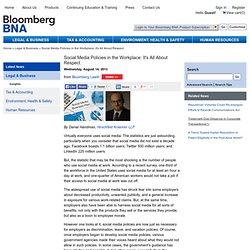
The statistics are just astounding, particularly when you consider that social media did not exist a decade ago. Facebook boasts 1.1 billion users; Twitter 500 million users; and LinkedIn 225 million users. But, the statistic that may be the most shocking is the number of people who use social media at work. According to a recent survey, one-third of the workforce in the United States uses social media for at least an hour a day at work, and one-quarter of American workers would not take a job if their access to social media at work was cut off. The widespread use of social media has struck fear into some employers about decreased productivity, unwanted publicity, and a general increase in exposure for various work-related claims.
However one looks at it, social media policies are now just as necessary for employers as discrimination, leave, and vacation policies. Courtesy is the responsibility of every employee. Consider this example. E—Etiquette. Managing and Leveraging Workplace Use of Social Media. Overview The exploding growth of social media has significantly changed the way people communicate at home and at work.
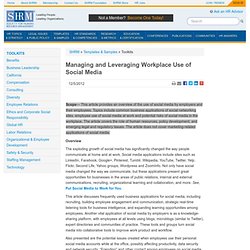
Social media applications include sites such as LinkedIn, Facebook, Google+, Pinterest, Tumblr, Wikipedia, YouTube, Twitter, Yelp, Flickr, Second Life, Yahoo groups, Wordpress and ZoomInfo. Not only have social media changed the way we communicate, but these applications present great opportunities for businesses in the areas of public relations, internal and external communications, recruiting, organizational learning and collaboration, and more. Facebook Profiles Reflect Actual Personality, Not Self-Idealization: EBSCOhost. Employer Access to Social Media Passwords Legislation. Increasing numbers of Americans use social media both on and off the job.
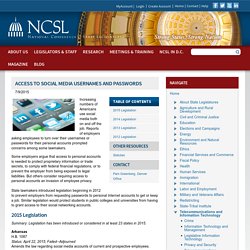
Reports of employers asking employees to turn over their usernames or passwords for their personal accounts prompted concerns among some lawmakers. Some employers argue that access to personal accounts is needed to protect proprietary information or trade secrets, to comply with federal financial regulations, or to prevent the employer from being exposed to legal liabilities. But others consider requiring access to personal accounts an invasion of employee privacy. State lawmakers introduced legislation beginning in 2012 to prevent employers from requesting passwords to personal Internet accounts to get or keep a job. Similar legislation would protect students in public colleges and universities from having to grant access to their social networking accounts. 2015 Legislation Summary: Legislation has been introduced or considered in at least 23 states in 2015.
S.B. 426Status: May 19, 2015; Signed by Governor. Forget the Fockers: meet the Stored Communications Act. By way of legal background, the Electronic Communications Privacy Act (“ECPA”), enacted in 1986, is comprised of two statutes: the Wiretap Act and the Stored Communications Act.
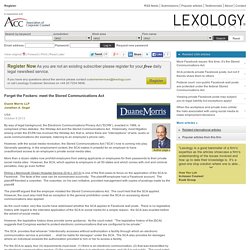
Historically, most litigation arising under the ECPA has involved the Wiretap Act, that is, where there are “interceptions” of wire, audio or aural communications (for example, listening to an employee’s phone call). Social Media Strategies in Recruiting, Hiring Pose Legal Risks for Employers. By Michael Bologna April 7 — Although social media websites have become powerful tools for recruitment and hiring, employers that rely too heavily on these channels to attract and screen talent might expose themselves to significant legal risks, employment attorneys and recruiting specialists told Bloomberg BNA in recent interviews.
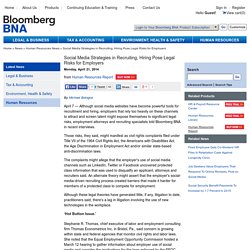
Those risks, they said, might manifest as civil rights complaints filed under Title VII of the 1964 Civil Rights Act, the Americans with Disabilities Act, the Age Discrimination in Employment Act and/or similar state-based anti-discrimination laws. The complaints might allege that the employer's use of social media channels such as LinkedIn, Twitter or Facebook uncovered protected class information that was used to disqualify an applicant, attorneys and recruiters said. An alternate theory might assert that the employer's social-media-driven recruiting process created barriers that made it harder for members of a protected class to compete for employment. Results.